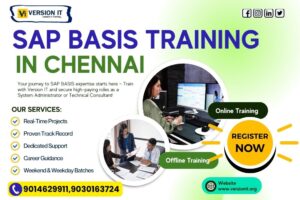In today’s digital economy, businesses are under constant pressure to streamline their sales processes, optimize customer service, and manage distribution channels efficiently. That’s where SAP SD (Sales and Distribution) comes into play. As a core module of SAP ERP, SAP SD is responsible for managing everything from customer orders to billing and delivery. In 2025, this module remains a vital piece of enterprise operations—and a high-demand career path for IT and business professionals alike.
Whether you’re an aspiring ERP consultant, a recent graduate, or a professional planning to upskill, SAP SD offers a stable and rewarding career with global demand and long-term growth potential. Let’s explore why SAP SD continues to stand out as a top career choice in 2025.
- SAP Is Still the Global ERP Leader
SAP has long held its position as the global leader in enterprise resource planning software, used by 90% of Fortune 500 companies. Despite new competitors entering the market, SAP’s S/4HANA suite remains the preferred solution for large-scale business operations, especially in industries like manufacturing, retail, and logistics.
SAP SD, being a critical module within the S/4HANA ecosystem, is essential for managing the order-to-cash (O2C) cycle, sales forecasting, pricing, and invoicing. Companies can’t afford to get these wrong—so they continue to rely on experienced SD consultants to implement and maintain these systems.
- Integral Role in the Order-to-Cash (O2C) Process
The SAP SD module governs the entire O2C cycle, which includes customer order management, delivery, invoicing, and revenue recognition. This makes it a mission-critical part of any SAP implementation. As companies seek to optimize customer satisfaction and streamline revenue channels, the O2C process becomes increasingly strategic.
Professionals trained in SAP SD can help organizations minimize delays, improve order accuracy, and enhance overall operational efficiency. This makes SD consultants valuable assets, especially in global organizations with complex sales structures.
- High Demand Across Multiple Industries
SAP SD skills are not limited to any single sector. From FMCG and pharmaceuticals to automotive, electronics, and IT services, nearly every industry relies on effective sales and distribution workflows. As these sectors adopt or upgrade to SAP S/4HANA, the need for professionals with SAP SD knowledge continues to grow.
Industries that frequently hire SAP SD consultants in 2025 include:
- Manufacturing and Industrial Engineering
- Retail and Wholesale Distribution
- Consumer Packaged Goods (CPG)
- Healthcare and Pharmaceuticals
- Telecommunications and Technology
This wide applicability makes SAP SD one of the most versatile and transferable ERP skill sets.
- Competitive Salaries and Global Opportunities
SAP SD consultants continue to enjoy high salary packages in both domestic and international markets. In 2025, entry-level SD consultants can expect attractive pay scales, while experienced professionals with hands-on project exposure command premium salaries and benefits.
According to global job data, certified SAP SD consultants are often eligible for:
- Average annual salaries ranging from $70,000 to $120,000 internationally
- Remote and hybrid work flexibility
- Relocation and visa sponsorship opportunities
- Freelancing or contract consulting roles with top consulting firms
As companies digitize sales operations, the demand for SD consultants with hands-on implementation and configuration skills has reached new heights.
- Integration with Other SAP Modules
SAP SD does not function in isolation—it integrates tightly with other SAP modules such as MM (Materials Management), FI (Financial Accounting), PP (Production Planning), and CRM. This cross-functional involvement gives SD consultants a well-rounded understanding of business processes and makes their role even more critical during large-scale implementations.
Learning SAP SD also opens doors to hybrid roles like techno-functional consultant, pre-sales solution architect, or SAP project manager. This flexibility makes it easier for professionals to pivot or grow into new domains within the SAP ecosystem.
- Continuous Learning with S/4HANA Innovations
SAP SD has evolved with the transition from ECC to S/4HANA, and 2025 brings even more innovation. With features like advanced ATP (Available-to-Promise), embedded analytics, and Fiori apps for sales order processing, SAP SD is no longer just about traditional order management—it’s a smart, insight-driven platform.
Professionals who stay updated with these enhancements are more likely to be placed in strategic roles that go beyond basic configuration. The constant evolution of SAP means there’s always room to grow, learn, and lead in your SAP SD career. You can become a job-ready expert in SAP SD by joining Version IT’s advanced SAP SD Training in Hyderabad course.
Conclusion
SAP SD continues to be one of the most rewarding and future-proof career paths in the SAP ecosystem. Its deep involvement in core business functions, high demand across industries, and alignment with digital transformation make it a strong option for anyone looking to build a stable and lucrative ERP career in 2025. As organizations evolve, professionals who understand sales, distribution, and SAP technology will remain in high demand globally. If you’re looking to begin your SAP SD journey or upgrade your skills, Version IT offers expert-led, hands-on SAP SD Course in Hyderabad program. Explore our comprehensive SAP SD Course to gain real-world knowledge, certification support, and career placement assistance.




